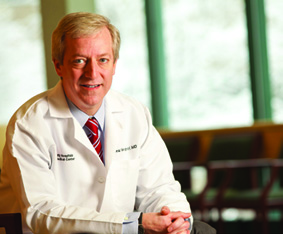Jun 22, 2011
 |
An interview with Cancer Research Committee Past Chair Neal J. Meropol, MD
In September 2010, the ASCO Board of Directors approved a clinical trials strategic plan defining the Society’s role in supporting clinical investigators and increasing participation in cancer clinical trials. In the following interview, Neal J. Meropol, MD, discusses the Cancer Research Committee’s efforts to put the plan into action.
AC: Why is this such a critical time to focus on clinical trials support?
Dr. Meropol: We’re at a point when progress in science and technology has made available a wealth of new agents and devices for diagnosis, treatment, and follow-up. It’s well recognized that progress in managing cancer is dependent upon well-executed clinical trials, and we now have a huge opportunity to test new interventions.
AC: What was the first priority in bringing the Board’s strategic plan to life?
Dr. Meropol: The first step the committee undertook was to work with the Board in developing a list of desired outcomes and actions required to accomplish the outcomes. The Cancer Research Committee is a particularly important committee in that it bridges the realms of research and policy, and in doing so can have a broad impact on behalf of our patients. ASCO also recently cosponsored a meeting withAn interview with Cancer Research Committee Past Chair Neal J. Meropol, MDFrom Vision to Reality:Implementing ASCO’sClinical Trials Strategic Planthe Institute of Medicine (IOM) to discuss progress made in addressing the content of IOM’s report on the clinical trials system [iom.edu/reports].
AC: What actions will the committee pursue over the next year?
Dr. Meropol: We are developing a forum that will represent an opportunity for community oncologists who participate in research to share best practices and identify barriers to successfully integrating clinical trials into routine practice. We are engaged in policy discussions regarding the implementation of legislation that will ensure coverage of routine costs of patient care for those taking part in clinical trials. We also have a variety of activities related to educating ASCO members about the importance of clinical trials, and to providing tools to help members interested in expanding their ability to effectively integrate clinical trials into their practice.
We are undertaking an evaluation of the clinical investigator workforce with a goal of proposing interventions to ensure that we are adequately training and supporting the researchers of tomorrow. We have already conducted focus groups with early-stage investigators and have identified several barriers that might discourage oncologists from selecting a career in clinical research. We’re using that information to prepare a survey of ASCO fellows and early-career members to assess influences on their career choices, identify impediments to becomingclinical investigators, and proposesolutions.
AC: How will you know if your actions have been successful?
Dr. Meropol: The most tangible metric will be an increase in patient participation in clinical trials. This will require greater awareness of the importance of clinical trials among the general population, the commitment of practicing oncologists to the importance of clinical trials in improving the outcomes for our patients, the commitment of payers to promote and support participation in clinical trials, and clear legislative support in the forms of funding and payment for patient care and physician time and effort.
Dr. Meropol is Chief of Hematology and Oncology and the Dr. Lester E. Coleman Jr. Professor of Cancer Research and Therapeutics at University Hospitals Case Medical Center and Case Western Reserve University. He is the current Chair of ASCO’s Comparative Effectiveness Research Task Force and has served on the Cancer Education Committee, Scientific Program Committee, and Cost of Cancer Care Task Force.
